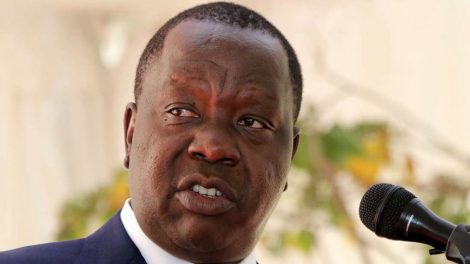Matiang’i attributes reduced crimes at borders to multi-agency approach
By Zadock Angira, July 2, 2021Interior Cabinet Secretary Fred Matiang’i yesterday said crimes at the country’s borders have reduced.
He attributed the development to a multi-agency approach in managing the points of entry and exits.
Matiang’i said through the Kenya Coordinated Border Management Programme, there has been a well-coordinated sharing of intelligence among the agencies leading to enhanced national security and public safety.
“This has also resulted in efficiency in border management, increased revenue collection, enhanced information-sharing, fight against illicit trade, and environmental protection,” the CS said.
Crimes include terrorism, human and drug trafficking and smuggling and other transnational organised crimes.
Border control
Matiang’i (pictured) said the role of border control had come a long way and is presently to enhance national security, public safety, economic security, environmental and revenue protection.
The National Intelligence Service, Immigration Department, police, Kenya Revenue Authority, Kenya Airports Authority, Kenya Ports Authority among other Government agencies and international organisations are now working in a coordinated manner.
“It is a departure from the past where border control and enforcement operations were undertaken by different organisations working in an uncoordinated manner.
Instead it enhances interoperability, efficiency, effectiveness and seamless service delivery at the points of entry and exit, which include land, air and maritime borders,” Interior Chief Administrative Secretary Hussein Dado said.
As a result of the initiative and to make it more efficient, it will now be mandatory for all Government officers working at border points to undergo training in order to continue inculcating the Whole-of-Government Approach in their day-to-day activities.
Training will be at the Kenya School of Government (KSG).
KSG Director General Prof Ludeki Chweya urged for more research in the area of border security, which he said, would inform strategic capacity development.
The officials will also be trained on a common programme to ensure attainment of uniformity, consistency and standardisation of services.
More Articles

